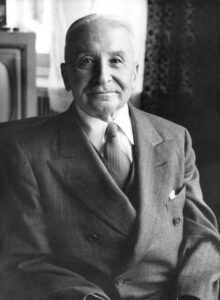Ludwig Mises (1881-1973) was an Austrian economist.
© Article written by Gabriel Godeffroy for the Central Europe Foundation
Photo: “Ludwig Mises”, Mises Institute
After obtaining his doctorate in Law at the University of Vienna, where he studied Economics, Ludwig Mieses entered the service of the Chamber of Commerce of Vienna in 1909. Before the First World War, Mises habilitated in Economics and started teaching at the University of Vienna, where he became Professor in 1918.
In September 1925, Ludwig Mises participated in the first Central European Economic Congress. From 1928, he was also a member of the International Committee of the European Customs Union. Following the publication of one of Elemér Hantos’ books in which he presented the economic unification of the successor states of Austria-Hungary as the first step towards a European customs and economic union, Mises resigned in March 1929, considering it impossible for him to participate in organizations that opposed the economic attachment of Austria to Germany. However, after the rise of National Socialism in Germany, he participated in the Pan-European Economic Conferences organized by Count Richard Coudenhove-Kalergi.
In 1934, Ludwig Mises was invited by William Rappard to take on a Guest Professorship at the Graduate Institute of International Studies in Geneva. In 1940, he emigrated to New York, where he continued his scientific work during and after the Second World War. Ludwig Mises was known as a “leading representative” of economic liberalism.
--F. A. Hayek, "In memoriam Ludwig Mises (1881-1973)”, Zeitschrift für Nationalökonomie, Nr. 33, 1977, S. 461-462.
--Jörg Guido Hülsmann, “Ludwig von Mises and libertarian organizations: strategic lessons”, New Perspectives on Political Economy, vol. 8, n. 1, 2012, p. 1940.

